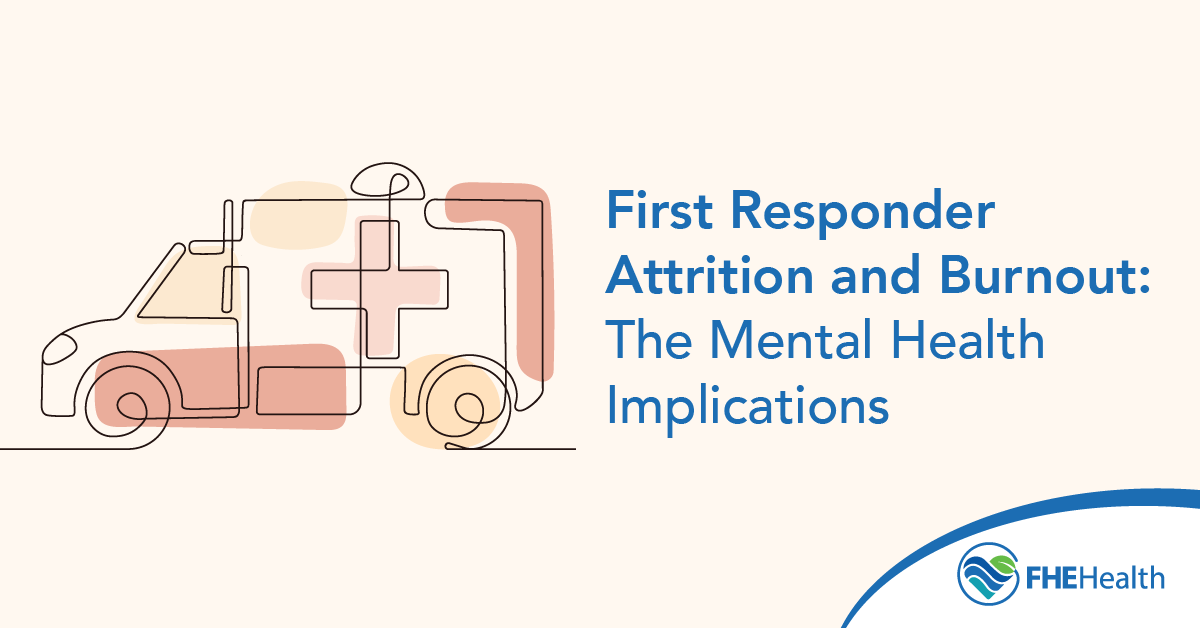
First responder mental health statistics reveal an epidemic of depression, anxiety and PTSD. Here’s a look at the causes and treatment options.
First responder mental health statistics reveal a shocking epidemic: According to the Substance Abuse and Mental Health Services Administration (SAMHSA), around 30% of first responders develop behavioral health conditions such as depression and PTSD. What are the unique mental health experiences that can affect first responders’ job satisfaction and quality of life, and what treatments can help? Answers to these and similar questions can shed light on the role of mental health issues in shortages of law enforcement and emergency personnel.
Exploring First Responder Mental Health Statistics
First responders suffer from high rates of depression, burnout and suicide attempts. A recent statewide survey revealed that in New York alone, 68% of first responders reported feeling stressed. Additionally, 53% of first responders experienced depression symptoms, while PTSD rates were as high as 38%. Unfortunately, 80% of respondents admitted the stigma associated with mental illnesses made it harder for them to seek help.
Common First Responder Mental Health Issues
First responders face a higher-than-average risk of developing mental health conditions, including:
- Post-Traumatic Stress Disorder
Post-traumatic stress disorder is a serious mental health condition that typically involves flashbacks to the point of trauma in a person’s memory. Symptoms such as generalized anxiety, insomnia and even skin conditions can also accompany the disorder. With treatment, which typically involves cognitive behavioral therapy, art therapy or biofeedback, clients can experience an improvement in their condition. - Depression
One in six adults will experience at least one clinical bout of depression in their adult life. The depression can be debilitating and involve suicidal thoughts. Many first responders may choose to self-medicate. The use of alcohol or pills (prescription or illicit drugs) can pave the path to drug or alcohol addiction. - Anxiety
Anxiety is a mental health condition associated with serious fear or even panic. A first responder with anxiety might experience panic attacks or difficulty breathing. Anxiety is treatable, but many first responders are afraid to seek treatment for it out of fear that doing so will ruin their prospects for promotion.
What Causes First Responder Burnout?
Work-related job stress is a serious issue affecting first responders and their mental well-being. Whether they witness trauma or experience it, they can suffer tremendously. First responders are typically first on the scene in worst-case situations. Witnessing people, especially children, who’ve been injured can trigger an inordinate amount of stress and impact first responders’ mental health.
Moreover, many first responders have experiences impacting their stress levels. Police officers can get shot at. Firefighters can sustain serious injuries. EMTs can face an emergency where their skill set only goes so far. These job stressors, if not properly managed, can impact a first responder’s mental health and well-being.
The Importance of Mental Health Support for First Responders
A problem compounding these mental health challenges is a lack of treatment and peer-appropriate resources for first responders. Early intervention can often relieve mental health symptoms before they escalate, but many first responders aren’t able to access this type of care. Seeing a therapist may be prohibitively expensive because the option isn’t covered by a health plan, for example.
The unique mental health needs of first responders also call for specialized treatment and support. Today, the medical community is largely aware of the higher prevalence of issues such as substance abuse among the first responder community, yet there remains a scarcity of recovery resources geared specifically for this population.
Reducing Turnover in the Workplace
First responder burnout can lead to excessive staff turnover, forcing workplaces to train and hire new employees. Instead, HR professionals could direct the time and resources this costs to mental health initiatives. With reduced burnout, employers could retain first responders for longer periods of time, improve company morale and earn a reputation as a great place to work.
Offering employer-sponsored counseling could reduce stigma and encourage first responders to seek help. This could create a company culture of talking about problems instead of dismissing them. Employers could also include therapy, medication and psychiatric hospitalizations in their insurance plans. They might even develop an app that provides wellness programs and self-care advice.
Professional Mental Health Strategies
Mental health providers have various treatment techniques and methodologies available to promote well-being and effective management of mental health conditions for first responders, such as depression and anxiety.
Treating first responders who are struggling with anxiety, depression or another mental illness often begins with a careful evaluation. At FHE Health, our medical providers perform a thorough psychiatric evaluation to determine the individual’s needs. This evaluation includes a neuro assessment, which uses the latest technologies to provide a map of the brain and identify areas of dysregulation. From there, we’re able to recommend a plan of treatment, which may include medication, therapies such as EMDR, peer support groups and neurotherapy to restore areas of brain dysfunction.
Get Help for First Responder Burnout
If you’re a first responder who’s suffering from a mental health issue, you don’t have to face it alone. Many people have found healing, recovery and a new lease on life through Shatterproof, our specialized treatment program for first responders. Contact us today to learn more.






